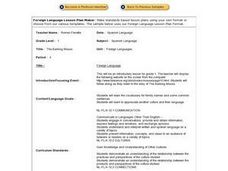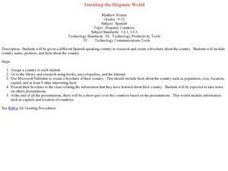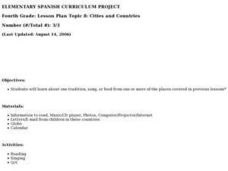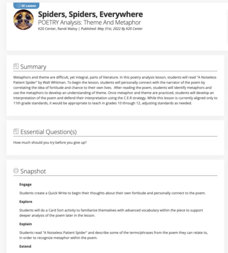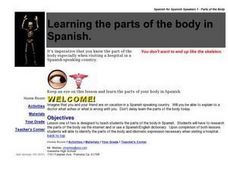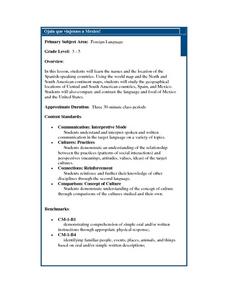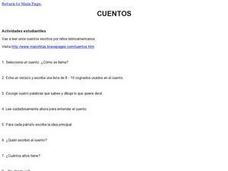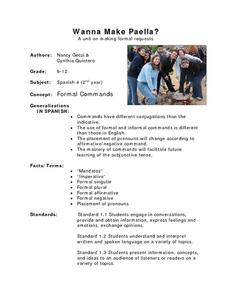Curated OER
Hay un Chico Mexicano
Students explore Hispanic challenges. In this introductory Spanish instructional activity, students read structured narratives pertaining to Hispanic children. Students discuss the narratives in order to better understand the lives of...
Curated OER
The Banking Mouse
First graders learn about another culture and its language. In this Spanish lesson, 1st graders listen to a Cuban folktale. Students identify the Spanish words. Students reread the story independently. Students listen to a guest...
Curated OER
Qu¿¿ tiempo hace?
Middle schoolers use the internet to gather information on Spanish cities and its weather. After completing a worksheet, they compare and contrast the weather conditions for the cities they researched. They share their information with...
Curated OER
Vamos al Cine
Students research movies originally made in Spanish. Using the Internet, they complete a worksheet with questions in Spanish. They focus on movies in Spain or Mexico and discuss their findings. They watch appropriate films in Spanish as...
Curated OER
Superlative Form
Pupils examine how to correctly use and form the superlative form. They practice writing and speaking Spanish words using the correct superlative form. Students complete a worksheet using the superlative form of words correctly.
Curated OER
Traveling the Hispanic World
Young scholars research an assigned Spanish speaking country using both Internet and print resources. They determine facts about the country such as its population, size, location, capital, and at least five other interesting facts. They...
Curated OER
TAPAS
Third graders, with a partner, choose English and Spanish recipes and make them at him, videotaping themselves making tapas and explain what they're doing in Spanish.
Curated OER
Cities and Countries
Part of studying Spanish is learning about the customs, food, and traditions of other countries. Use the links provided (and some of your own) to study Venezuela, Uruguay, Guatemala, and Peru. Elementary learners will get a glimpse of...
Curated OER
The Four Elements
Young, native Spanish speakers learn about the four elements: earth, fire, air, and water. As a group, discuss the different senses you might use with each element. This is a teacher-centered lesson, but consider having individual...
Teach-nology
Author’s Purpose: Inform
Why does an author write an informative article? Learners examine passages of a short reading on Spain and determine what the author wanted to inform the reader about.
Agency for Toxic Substances and Disease Registry
Don't Mess with Mercury (Lesson C)
The health effects of mercury exposure if the focus of the first of three activities about the properties of metals. Pairs research mercury to write, prepare, and share posters, articles, or PSAs with the class.
Agency for Toxic Substances and Disease Registry
Don't Mess with Mercury (Lesson A)
Mercury is the only metal that is a liquid at room temperature. Teach your class this and many more interesting mercury facts by assigning an engaging task. A public relations activity, the exercise informs pupils of the hazards of...
K20 LEARN
Spiders, Spiders, Everywhere: Poetry Analysis - Theme And Metaphor
Walt Whitman's poem "A Noiseless Patient Spider" provides high schoolers an opportunity to reflect on the importance of perseverance and fortitude. After drafting a Quick Write about a time they tried and tried again to accomplish...
Baylor College
What's Is Soil Made Of?
It's time to roll up those sleeves and get a little dirty in the second instructional activity of this series on the science of food. Investigate where plants and animals get the minerals they need to live in this two-part exploration of...
Pearson
Advice: Should, Shouldn't, Ought to, Had Better, and Had Better Not
You shouldn't miss out on an opportunity to review should, shouldn't, ought to, had better, and had better not! Elementary and middle schoolers view a slideshow presentation that focuses on usage rules and examples for these tricky verbs.
Curated OER
Learning the Parts of the Body in Spanish
Students use the Internet or Spanish dictionary to find the Spanish words for the names of the parts of the body. They examine expressions needed in case they would get hurt and needed to go to the hospital.
Curated OER
Celebrate Hispanic Heritage Month
Learners explore Spanish speaking countries. In this multi-cultural literacy lesson, students research a country in which Spanish is the official language, and create a related travel brochure on the computer.
Curated OER
Yellow Journalism in the Spanish-American War
Students write a newspaper based on events in the year 1898 using Yellow Journalism, the exaggeration of facts or events.
Curated OER
Design a Latin American Restaurant
Students investigate the culture of a Latin American country to design a new restaurant. In this Latin American lesson, students identify social classes, geographical locations, cultural practices, and monetary systems of a Latin...
Curated OER
Mira: Activity 2
Students are introduced to the story, Mira, and the puppets used to represent the characters in the story. They answer yes/no questions regarding the puppets and the color of clothing they are wearing. They begin a T-chart of various...
Curated OER
Ojala que viajemos a Mexico!
Students research the names and locations of Spanish speaking countries throughout the world. They use a world map to become familiar with the locations of these countries and use the Internet to conduct further research. They sing...
Curated OER
Stories in Spanish
Students read and examine online stories written by children of Latin America. They discuss the picture books they enjoyed when they were younger, complete a worksheet, and write and illustrate a story using a concept web and storyboard.
Curated OER
Meals in Mexico
Students discuss typical meals in the U.S. and Mexico. Students group pictures of food according to which foods are eaten at which meals in each culture.
Curated OER
Making Formal Requests
High schoolers investigate the concept of making formal requests and examples are included in the lesson for teacher presentation. They practice using the phrases in a variety of situations and then make presentations for others to hear.



